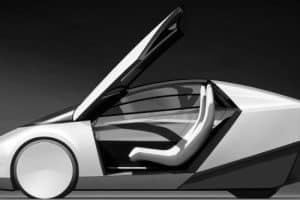Ford and University of Michigan researchers conducted a new study that evaluated the savings in greenhouse gas emissions in battery-electric pickup trucks relative to gas-powered pickups. It also assessed the reductions in other light-duty vehicles when compared to their gas-powered counterparts.
According to the study, sedan, SUV, and pickup truck battery-electric vehicles have approximately 64 percent lower cradle-to-grave life cycle greenhouse gas emissions than the same vehicles with combustion engine powertrains. On average, replacing a traditional gas engine with an electric powertrain can save up to 74 metric tons of carbon dioxide over the lifetime of a vehicle, the study says.
Automakers are utilizing the transition to electrification as a main strategy to combat rising greenhouse gas emission rates. Ford says light-duty vehicles, including sedans, SUVs, and pickup trucks, are currently responsible for 58 percent of the United States transportation sector’s emissions. Pickups made up 14 percent of light-duty vehicle sales in the U.S. in 2020, with increases in the sales of SUVs and pickups since that data was released, meaning more emissions are released every year.
Ford is one of the most committed automotive companies in terms of transitioning to electrification. The Mustang Mach-E, which hit the market first for Ford, has quickly become one of the best-selling EVs in the United States. Last year, it trailed only the Tesla Model Y in the all-electric crossover sector. The F-150 Lightning, Ford’s electrified take on its popular pickup truck series, is set to begin deliveries this Spring. Additionally, Ford has started shipping the E-Transit to fulfill commercial demands, including one 1,110-unit order for Wal-Mart.
The study gave more evidence that transitioning to electric powertrains is more sustainable than gas-p0wered options, especially from the vehicle’s first mile to its last.
“This is an important study to inform and encourage climate action. Our research clearly shows substantial greenhouse gas emission reductions that can be achieved from transitioning to electrified powertrains across all vehicle classes,” Greg Keoleian, a professor at the University of Michigan School for Environment and Sustainability, said. Keoleian was the study’s senior author.
THE STUDY
Researchers conducted a cradle-to-grave life cycle assessment of pickup tucks and compared it to an assessment of electrified versions of pickups, sedans, and SUVs. The study used three different model year 2020 powertrain options, including ICE engine vehicles, hybrid-electric vehicles, and battery-electric vehicles. The study looked at midsize sedans, midsize SUVs, and full-size pickups, accounting for differences in fuel economy, annual mileage, vehicle production, and vehicle lifetime across vehicle classes.
“This study expands upon previous studies that have focused on comparing battery-electric vehicle sedans to their internal-combustion-engine or hybrid counterparts,” Keoleian added. “We report emissions for vehicle production, use, and end-of-life stages on a per-mile basis and over the total vehicle lifetime. In addition, we analyzed the regional variation in emissions considering differences in electricity grid mixes and ambient temperatures, and we also explored the effects of the rate of grid decarbonization on emission reduction.”
Researchers found that switching to an electric vehicle results in great total tonnage of emissions reductions as the vehicle size increases. This is due to greater fuel consumption from larger-classed vehicles.
“Though the percentage savings is approximately the same across vehicle classes, on average replacing an internal-combustion-engine sedan with a battery-electric sedan saves 45 metric tons of carbon dioxide equivalent, replacing an internal-combustion-engine SUV with a battery-electric SUV saves 56 metric tons of carbon dioxide equivalent, and replacing an internal-combustion-engine pickup with a battery-electric pickup saves 74 metric tons carbon dioxide equivalent over the lifetime of the vehicles,” Max Woody, Center for Sustainable Systems Research Specialist, said. Woody is listed as the study’s first author.
Researchers also concluded that BEV manufacturing has larger emissions rates than ICE vehicle manufacturing. Battery-electric sedans had a breakeven time of 1.2 to 1.3 years, while SUVs sat at 1.4 to 1.6 years, and pickups sat at 1.3 years, based on the average U.S. grid and vehicle miles traveled, the study said.
Officially published on March 1 in the journal Environmental Research Letters, the full study is available here.





